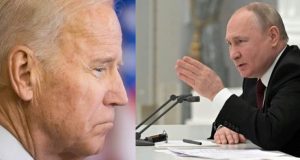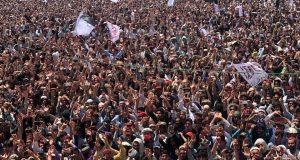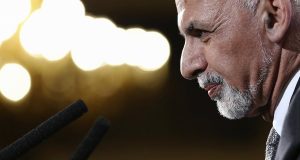On the evening of Monday, May 22, a group of Pashtun musicians from Peshawar lit up the Edmund Burke Theatre at Trinity College, Dublin with their electrifying, energetic instrumental folk sound, based on Pashtun tunes, fused with western instruments. Khumaryaan performed to a packed theatre with a big turnout of people originally hailing from Afghanistan and Pakistan. The concert involved interactive Attan styled dance with the audience, loud hand-clapping, occasional hilarious impromptu outbursts of vocal exchange in Pashto between band and audience members – culminating in a very entertaining and jubilant night which was evidently enjoyed by all. Consisting of four male musicians, the band’s motive and message is one of peace, inclusiveness: building bridges between people through the power of music. The concept of music as a universal language capable of transcending all barriers of country, religion and race, was certainly tangible on the night. (My interview with the band will be published in due course.)
The concert titled ‘Art for Social Change,’ was hosted by the Irish Muslim Peace and Integration Council (IMPIC), in conjunction with Trinity College Dublin and supported by the U.S. Embassy in Dublin. Special guests on the night included H.E. The Ambassador of Pakistan – Dr. Syed Rizwan Ahmed, Chair of IMPIC – Shaykh Dr. Umar Al-Qadri, Chairperson for the Afghan Community of Ireland and Ministry Council for Integration – Mr. Nasruddin Saljuqi and Deputy Director of Public affairs at U.S. Embassy, Dublin – Ms. Jennifer McAndrew.
In this article however, I will focus on the keynote speech delivered on the night by Shaykh Imam Dr. Umar Al-Qadri, whose inspiring talk concerning the role of music in Islam was both relevant to the musical event as well as powerful and educational. Dr. Al-Qadri is an Islamic Theologian at Al-Mustafa Islamic Educational and Cultural Centre in Ireland and Chairperson of the Irish Muslim Peace and Integration Council, whose objectives include working for an enlightened appreciation of Islam, promoting dialogue of tolerance and mutual respect in society, fostering community relations, promoting the concept of social inclusion, active citizenship, equality and the organisation of humanitarian relief efforts. Notably on the night, the organisers made a clear announcement to the packed house, that efforts should be made within the Muslim communities to keep terrorism and radicalism out of Ireland. We were advised that should we notice, see or hear of any elements, signs or warning signals within communities which may present potential danger, radicalisation or possible threats to society – we should immediately inform either IMPIC, elders, authorities or contact anonymously through a website page, the details of which the organisers provided on the night.
Dr. Al-Qadri began his speech with an explanation, clarifying the reasons why he, as the Chair of an Irish/Muslim organisation decided to organise a musical event. Beginning with his background, he told us he was born in Pakistan and brought up in the Netherlands. At the age of sixteen, he travelled to Pakistan where he subsequently spent seven years studying Islam and Islamic law. He moved to Ireland in 2004 and has lived in Ireland ever since. He stated that for someone with his roots in Pakistan, it is immensely disheartening for him that the only news we hear in the media about Pakistan is related to terrorism, extremism and radicalisation. He further stated that his time spent in Pakistan from 1995 – 2002, not only inspired him, but rather made him the person he is today – a person who promotes peace, builds bridges and advocates pluralism. He spoke of the great tradition of arts and music in Pakistan: a country which has produced some of the great thinkers, poets and philosophers.
Dr. Al-Qadri emphasised that as an Islamic theologian, religion is the most important thing for him. He stated that he did not invite Khumaryraan to perform merely to promote a good image of Islam and Pakistan, but as an Islamic theologian – a person for whom Islam is the most important aspect of life, he felt it necessary to address the ignorance concerning the role of music in the Islamic tradition, considering the contradictions and confusion among people who claim to be adherents of Islam.
He stated that there are many of the opinion that music is prohibited (haram) in Islam, yet he pointed out the irony of this opinion considering that sometimes these people will allow music for example in a cultural context. Dr. Al-Qadri went on to give us the example of President Trump’s recent visit to Saudi Arabia where Trump danced with the Saudis. This, he asserted, is an example whereby scholars argue that music is allowed, where they argue that religion has nothing to do with it because it is ‘cultural.’ Dr. Al-Qadri stated he disagreed with this view point for the simple reason that Islam is a code of life, a way of life. Islam, he emphasised, gives us guidance for every aspect of life and culture and the arts are part of life, therefore music should not be taken out of the equation. He went on to state that there is not a single verse in the Quran which prohibits music. He further stated that Hadith that speak against musical instruments must be contextualised, moreover, it is essential that the strength of the chain of Hadith should be taken into account. There is the idea that the ‘duff’ (tamborine) is the only instrument allowed according to scholars. Dr Al-Qadri states that the duff, was the musical instrument played at the time of the Prophet (PBUH) in Arabia, furthermore, pianos and guitars were not in Medina at that time. Therefore he quipped, you better also get rid of your cars, your BMW’s – because camels and horses were the only mode of transport at that time! He went on to give the example from the Hadith upon the Prophet’s entry to Medina where it was transmitted that the Prophet was welcomed by women and girls singing loudly.
Dr. Al-Qadri stated that one of the most important things that Allah says to us in the Quran is “why don’t you use your reason — why don’t you use your rationality.” Music is permitted according to the majority of Islamic scholars, but there are conditions. One condition is that music should not contradict Sharia law, for example should not involve vulgarity of any kind. Another condition where music is not permissible is music which removes or encourages a person away from worship and offering prayers.
Dr. Al-Qadri stated that to label something as haram you must have evidence from the Quran or the Sunnah – explicit evidence — and since we don’t have that, therefore musical instruments are permissible.
By Angelina Merisi
Angelina hails from Ireland. She is part of the Pashtuns Times’ Team. She has a BA degree in History of Art, MA in Study of Religions. She won a PhD scholarship for her research on Pashtun Culture and Society. She is currently on sabbatical. In the meantime, she continues writing and researching on Pashtun culture and society.
THE PASHTUN TIMES
 Pashtun Times Latest News
Pashtun Times Latest News







